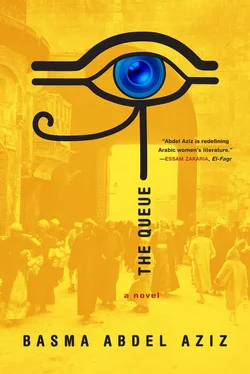On the fourth day after he was injured, he called Amani again and learned that she hadn’t been able to enter the hospital because of its complex security procedures. These were imposed to “ensure patient comfort,” she had been informed. She also told him that the Gate had released a statement claiming that no bullets had been fired at the place and time at which he had been injured. Several prominent journalists published full-page articles concurring that no bullets had been found, neither in the bodies of the dead nor of the injured. Eyewitnesses they quoted insisted that the people who caused the Disgraceful Events were just rioters who had suddenly “lost all moral inhibitions” and flown into a frenzy: first they insulted one another, then they threw stones, and finally they seized iron bars from an old, vacant building belonging to the Gate. Any injuries they sustained were simply puncture wounds they suffered while struggling over the bars they’d wrenched off.
On the phone, Amani read him a statement in The Truth newspaper made by an anonymous doctor supervising the treatment of the wounded at Zephyr Hospital. The doctor asserted that the high mortality rate was due to the fact that these rioters were simply too sensitive. Upon hearing one another’s harsh words, they’d succumbed automatically, their hearts having stopped before the ambulances even arrived. Others had stumbled upon the grisly scene and were so traumatized by it that they froze, and then they collapsed, too, falling one after another like dominoes. Some journalists went even further and published unconfirmed reports that the people who died were not in fact killed but had committed suicide when they saw what had happened. They even claimed that one of them had stabbed several others with an iron stake before turning it upon himself, Japanese seppuku-style. At this point, Yehya made a decision. He slipped away from his bed unnoticed and returned alone to the hospital where Tarek worked. When he arrived, he caught a glimpse of the doctor in the lobby, but was suddenly overwhelmed with fatigue and forgot the doctor’s name. He gestured toward him inquiringly, and a nurse responded automatically, without even glancing at the rotations sheet: Dr. Tarek Fahmy.
Back in the taxi, Yehya remembered the papers that Tarek had shown him in the hospital that day and let out a sigh. At first he couldn’t believe they were real, and looked carefully through the whole pile. But when he saw the Gate’s stamp on the back of every page, he realized that there was nothing he could do. He’d left the hospital and spent the first night lying by the side of the road. He felt hopeless: he couldn’t ask any friend or acquaintance for help. He didn’t have his phone on him, he couldn’t even walk, and no passing car would give him a lift because his injury looked so suspicious that helping him would put them in danger. The next day he begged a sympathetic stranger to let him use his phone, and was able to reach Nagy, who brought him home. Nagy stayed with him for days, how many exactly Yehya didn’t know, until the bleeding had stopped and the wound had closed, trapping the bullet in his pelvis. Then Nagy had gone with him to the Gate for the first time in their lives.
The car stopped on a quiet street, and Yehya snuffed out his memories. He paid the driver and stepped out of the taxi. Yehya walked through the hospital door with Amani by his side at precisely six in the evening, when Tarek’s shift began. They saw that Nagy had beaten them there, as they’d expected he would, and taken up a prime reconnaissance position that enabled him to see everyone who came in and out of the lobby. Sabah appeared apprehensive when she saw them. She was standing by the information desk, chatting happily with a colleague, and as they walked in, she stopped midsentence, revealing that she knew exactly who he was. He remembered her quite well, too, from his two previous visits to the hospital: her round face lined with care. She tried to act normal, greeting him with her customary phrase for all visitors, and asked him some standard questions as if he were one of the scores of new patients she saw every day. But the expression on her face betrayed her unease, and her words came out shaky and jumbled, her voice wavering. “I’ll look for him,” she said, as she rushed off toward Tarek’s office. “But, of course, Dr. Tarek might have left, he never works nights.”
The first time Sabah had seen Yehya was the night of the Disgraceful Events, as he was carried into the emergency room. She took him in, put an IV in the back of his hand to administer blood and fluids, and then left to help other patients while Tarek dealt with his injuries and observed his general state of health. That same night, at exactly 3:30 a.m., after all the patients had been transferred, Sabah received a personal call from a senior doctor at Zephyr Hospital, an influential man. He told her not to ask questions, but to go to the filing department, remove Yehya Gad el-Rab Saeed’s medical file, read it to him, and then alter some of the language to match what he had personally observed in the patient. The doctors and nurses were all overwhelmed with fatigue and the horror of what they had seen that day. Everyone went to lie down the first chance they got, and those who weren’t on the night shift headed home to sleep, as they all expected the events to continue the following day.
Sabah didn’t have much choice; the discussion was over in seconds. She was just a junior nurse there, young and insignificant, while the man on the other end was extremely senior, in age and position. Senior enough, perhaps, to fire her from this job and any other she might find, senior enough to shut down the entire hospital.
After things calmed down somewhat, when the night owls began to quiet and security measures waned, Sabah was able to sneak off and carry out the orders she had been given, fully and precisely. The second time she saw Yehya was an unlucky coincidence. He ran into her in the lobby, half-conscious and disoriented, asking for Tarek but not by name. Yehya didn’t spend long with him, and he left shortly afterward. She’d forgotten all about him, but now here he was, appearing before her for the third time like a ghost.
Nagy put the newspaper aside and joined his friends. Amani sat across from the corridor to the doctors’ offices, while Yehya leaned back against the wall, trying to stave off the pain by staying still as much as possible. He’d grown used to standing in the queue for hours on end, and now could stay like that for a whole day without his feet tiring or troubling him.
When Tarek arrived, he was as flustered as Sabah had been; he hurried toward them and then stopped in front of them, clearly nervous. He didn’t reach out for a handshake until Amani did.
“I’m Amani, a colleague of Yehya’s,” she said, offering her hand. “I brought him here when he was injured.”
Tarek gave her a quick smile, one that was not welcoming, and led them to his office. Nagy signaled that he would stay where he was. Tarek asked Sabah to bring them tea, and then firmly closed the door behind them.
“Yehya, hello. How are you feeling?”
“I’m good, Doctor, the wound is healing, but it still hurts. It feels like the bullet is moving around in there.”
“They haven’t done the operation yet? You must be here with authorization from the Gate, then, so we can schedule a suitable time?”
“Well, actually, I’ve finished part of the procedure — I submitted an application to the Booth with all the necessary paperwork, and now I’m just waiting to be granted the permit.”
Although she was annoyed by how formal and unfeeling the conversation was, Amani joined in with a sweet, pleasant smile, and a tone she tried to make as friendly as possible.
Читать дальше











